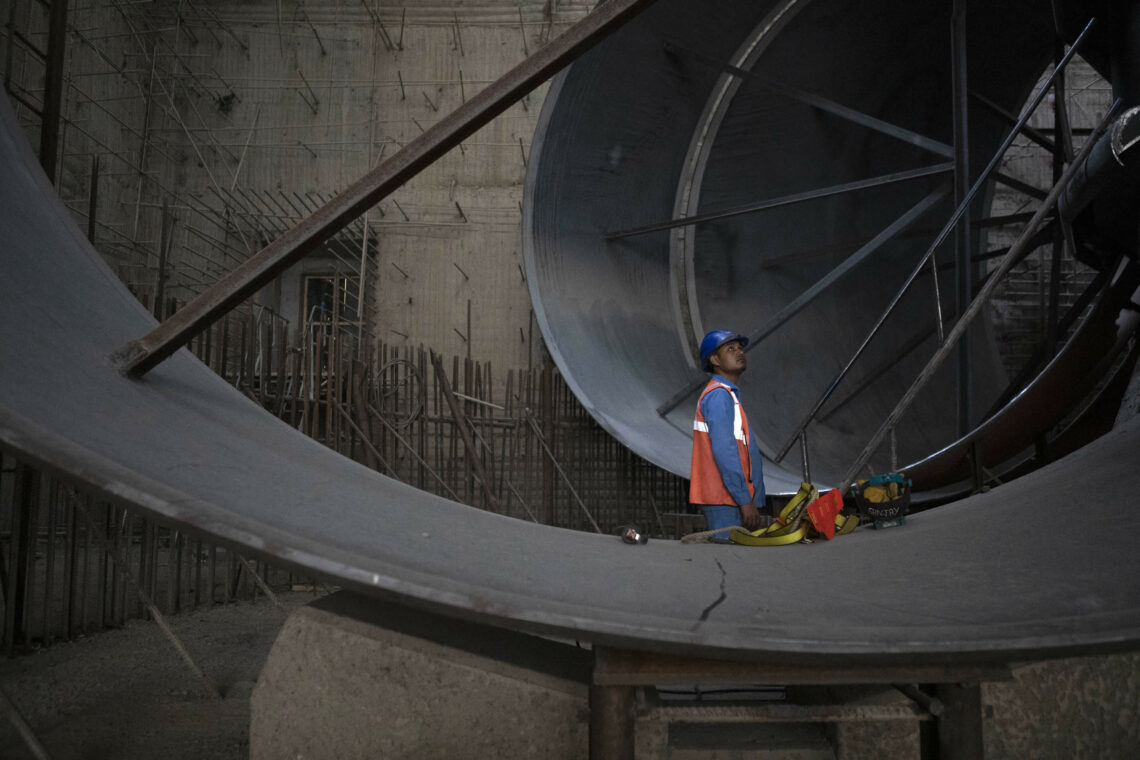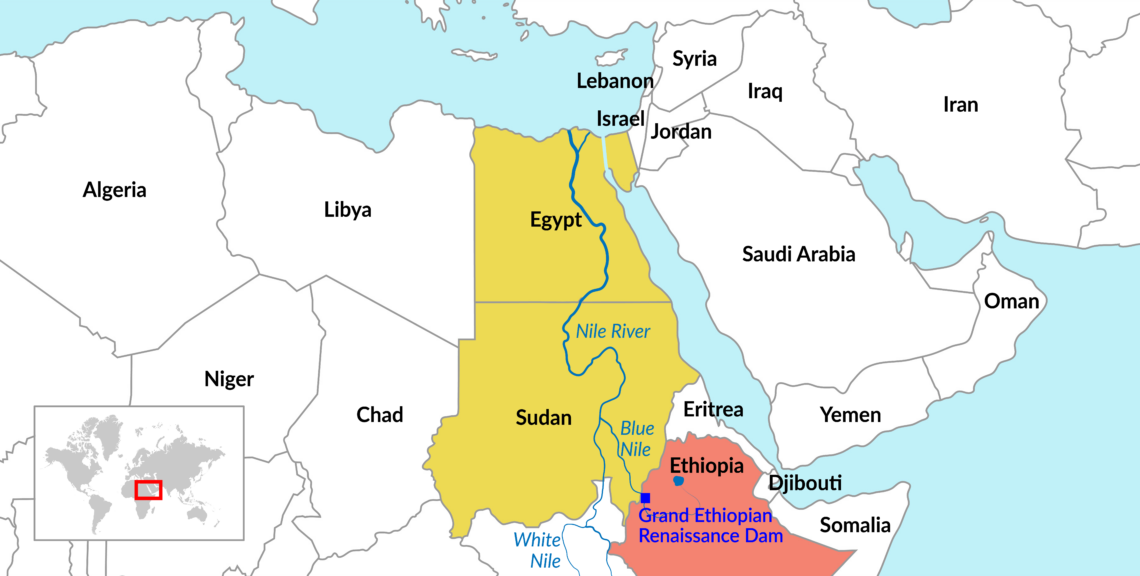The struggle for control over Nile waters
Ever since Ethiopia began constructing its Grand Renaissance Dam, tensions with Egypt and Sudan have been on the rise. Nevertheless, the project is now nearing completion. All of the countries involved are likely to seek a compromise to avoid a costly regional war.

In a nutshell
- Ethiopia’s mega-dam has caused regional tensions
- The countries involved seem unwilling to compromise
- A last-minute agreement could be reached to avoid war
New tensions in the Nile Basin emerged a decade ago, when Ethiopia started building Africa’s largest hydroelectric power plant, the Grand Ethiopian Renaissance Dam (GERD). Located on the Blue Nile, the $5 billion, 6-gigawatt dam is now more than 80 percent complete. The first filling took place in 2020. Recently, Addis Ababa announced that it had completed a second filling during the rainy season.
The Blue Nile originates at Lake Tana in Ethiopia and amounts to 85 percent of the Nile flow. However, Egypt and Sudan account for most of the water consumption. Tensions over the river are high, and all countries involved see the competition for control as a zero-sum game.
All parties are aware of the enormous costs involved in a potential armed conflict.
Ethiopia has described control of the waters as an “existential need,” while Egypt and Sudan speak of an “existential” or “national security” threat. Successive negotiations have failed and tones have sharpened. Still, all parties are aware of the enormous costs involved in a potential armed conflict.
Historical claims
Egypt has always claimed rights to the Nile waters. According to Cairo, this is supported by the 1929 Anglo-Egyptian Nile Treaty, as well as the 1959 Nile Waters Agreement with Sudan, which gives both countries exclusive rights over the river waters and a veto right over any upstream project. Both agreements, however, were never recognized by Ethiopia or other countries on the Nile.
In 2010, the Nile Basin states signed a Cooperative Framework Agreement (CFA) but Egypt and Sudan refused to implement the agreement. This means that there remains a legal void regarding water-sharing mechanisms. The construction of the GERD also began during a period of turmoil in Egypt, which contributed to Ethiopia’s unilateral approach.
A decade after the launch of this mega-project, and despite Egyptian President Abdel-Fattah El-Sisi’s warnings of a potential armed conflict, the main points of contention are no longer the construction or the filling of the GERD reservoir – both faits accomplis – but the schedule and duties involved, including what Ethiopia should do in case of a prolonged drought. For all parties, however, winning the dispute remains a vital matter.
Already facing water scarcity, Egypt fears losing control of the flow of the river.
Already facing water scarcity, Egypt fears losing control of the flow of the river. Given that agricultural production is dependent on irrigation and Nile waters account for more than 90 percent of renewable water resources, a decrease in water supplies could affect the livelihoods of nearly half the population. In Sudan, unregulated water flows could lead to the collapse of hydroelectric installations.
But for Ethiopian Prime Minister Abiy Ahmed, an operational GERD represents not only a unique opportunity to overcome the chronic power shortages that remain an obstacle to growth and development, but also to deliver on something that has become a symbol of national union and progress. The project has mobilized Ethiopians at home and abroad. The Commercial Bank of Ethiopia has even launched an app called ItIsMyDam to process contributions from the diaspora.
Egypt argues that the number of years to fill the dam should be determined by how the Blue Nile shifts and expands, and that Ethiopia must commit to a minimum amount of water to be released downstream if there is a prolonged drought. While Ethiopia seems willing to extend the filling process from the initial two to three years to four to seven years, it seems unwilling to accept the second demand.
Diplomatic failures
Several actors have tried to mediate the GERD negotiations, but the process has been marked by failure. In 2020, Ethiopia rejected a proposal drafted by the United States and called for negotiations to be conducted under the mediation of the African Union (AU), to avoid an “internationalization” of the dispute. But the failure of the African Union mediation efforts became evident in April 2021, when President El-Sisi warned about “inconceivable instability in the region” if Ethiopia was to take “a single drop of water from Egypt.” It was probably not a coincidence that this statement was made during a visit to the Suez Canal, when a stuck container ship threatened global commerce.
Facts & figures

After this failure, Egypt and Sudan – backed by the Arab League – requested the intervention of the United Nations Security Council. Given the allegiances and interests binding them to the countries involved, the U.S., China and Russia tried to adopt a neutral position, calling for cooperation and a peaceful settlement of the dispute. However, the second filling, announced in July, occurred in the absence of an agreement, crossing what President El-Sisi had defined as a red line. Egypt also recently won a diplomatic victory when the UN Security Council made a statement urging the three countries to resume negotiations under AU mediation to agree on a binding legal agreement.
Scenarios
Internally, Egypt and Ethiopia are facing economic challenges, political volatility, and in the case of the latter, a civil war. This creates a dilemma: while neither of them can afford a diplomatic and political defeat in the GERD dispute, they also cannot afford the costs of a potential armed conflict.
From a global perspective, in a continent where transboundary rivers are a critical source of fresh water and where tensions over land and water are on the rise, the outcome of this dispute is expected to set important precedents.
Two scenarios must be considered. Under a first and most likely scenario, the parties will find a compromise balancing Ethiopia’s claims and Egypt’s needs in case of prolonged drought. Both parties are aware that the GERD’s impact on water availability will depend mostly on the Nile flows, which are beyond human control.
An operational GERD could better regulate water flows while increasing the availability of electric power in the region. In the absence of a prolonged drought, this would result in a win-win situation, with Cairo and Khartoum – which did not pay for the GERD – becoming free riders. Moreover, neither country is in a position to engage in an armed conflict and challenge the American, Chinese and Russian calls for a peaceful resolution. Finally, Sudan, where a civilian-led transitional government is being supported by Washington, may be pressured to work toward a nonviolent solution.
However, such a resolution could be the result of open or closed negotiations, resulting in either explicit or implicit agreements. Whereas in both cases an armed conflict would be avoided, each outcome would set a different precedent for future disputes over resources.
A second, less likely scenario, would be one of escalating tensions leading to armed clashes. President El-Sisi has warned that Egypt’s water was a “red line” and recently conducted joint military exercises with Sudan in a clear show of force. Such a scenario, which remains a medium- or long-term possibility, could come about over fears of a rapid reduction of water resources in Egypt, for which Cairo would blame the GERD management.
Water scarcity is already a challenge in Egypt, where the population has grown from 27 million to more than 100 million over the last six decades. A prolonged drought causing food insecurity and popular unrest could lead Cairo to consider military options.








